 BBC News
BBC NewsBorrowing was £17.4bn last month, the second highest October figure since monthly records began in 1993.
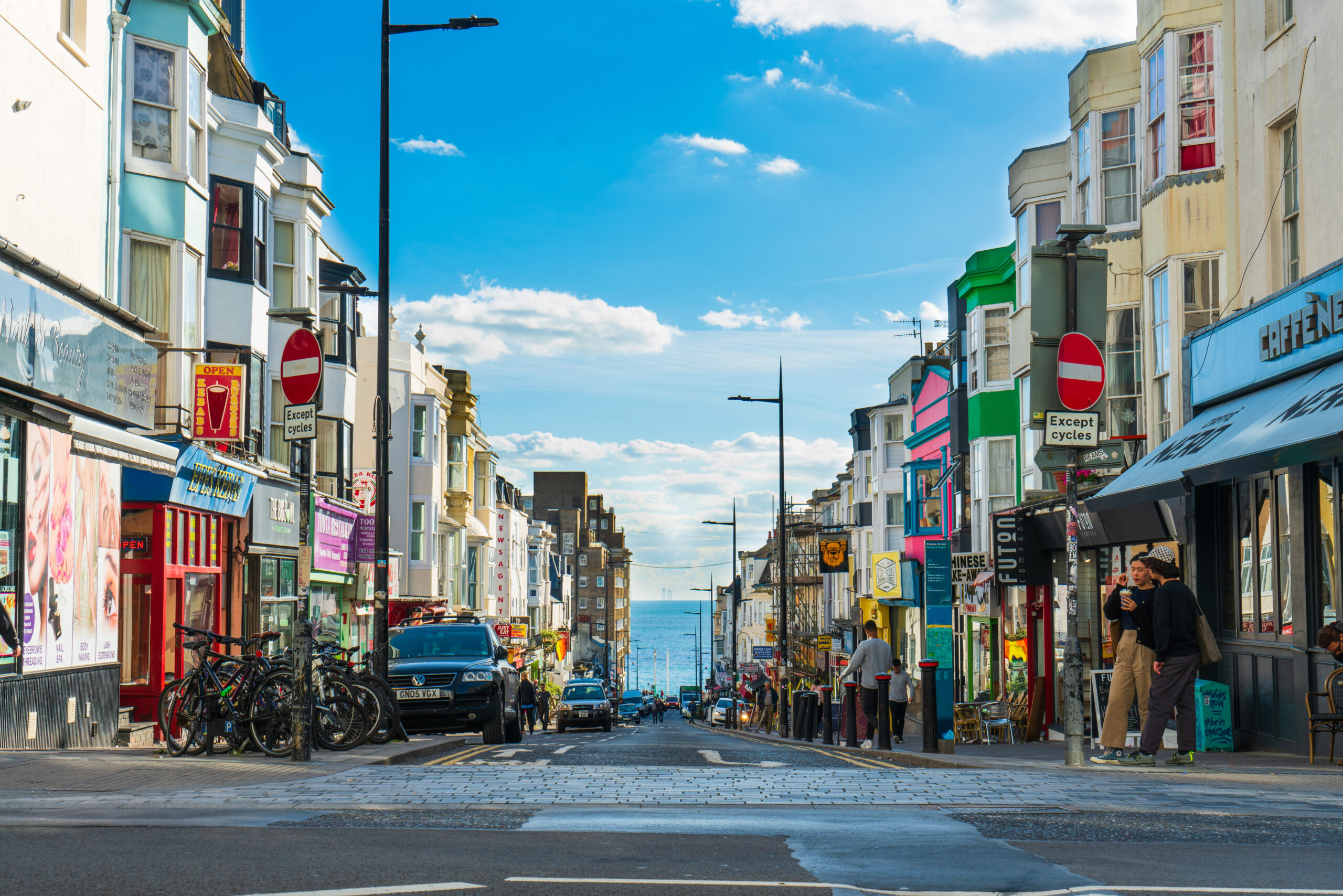
Iris Spark heads to the south coast with her family – and finds much to enjoy at the Hotel Harbour chain
The novelist John Updike once described his project as a novelist as being: ‘To give the mundane its beautiful due’. He was saying that it takes a certain skill to see what’s directly in front of you.
In that sense Covid-19 has made us all novelists. For the Londoner, a trip to Brighton used to be seen as a day affair. You don’t need to be in Brighton long to realise that for many people it still is. The crowds still pour down remorselessly from the station towards the seafront throughout the day, adding an air of excitement – though sometimes of threat – to the town. Graeme Greene opens his novel Brighton Rock with the famous line: “Hale knew, before he had been in Brighton three hours, that they meant to murder him.” London here appears as a kind of bacillus which the rest of the country is subject to.
But once you’ve been in Brighton for longer, recentred around the necessity of a longer stay, London feels a distant memory. For Brighton residents, of course, London is both a destination – pre-Covid about 25 per cent of its residents commuted to London – and something intentionally escaped. People here have made a decision for a different kind of life.
That means that something else is one the rise: Brighton’s uniqueness. That’s told partly in politics: Caroline Lucas has been the Member of Parliament here for eleven years. At the time she looked like the first of many MPs from the Green Party. As the years have worn on – even as the issue has deepened in importance –there has been no tsunami to speak of in the wider electorate. This has only served to remind everyone of the quiddity of Brighton. Often Lucas gains the credit, but she’s also the beneficiary of an open-minded electorate, not to mention an enviable on-the-ground operation which continues to bewilder the local Labour Party.
Brighton’s apartness is also told in the city’s startup culture: there were 2,100 business start-ups here in 2015, and according to a report by Regeneris, Brighton is also home to a greater concentration of homeworkers than any other UK city. In that sense it was always pandemic-ready.
We check into the Harbour Hotel, a restored Regency building, one of the oldest on the promenade, and are given a sea-view room on the fourth floor. With young children in tow, the lack of a balcony is welcome and the triple-aspect panoramic superb. We gaze at it a while: seen before but never quite like this. There’s the pier to the east, whose night lights are beginning to flash in the gloaming; the distant wind farms look like something Don Quixote might madly tilt towards; and the west pier, burnt to a sculptural cinder after arson in 2003, has a sad romantic air.
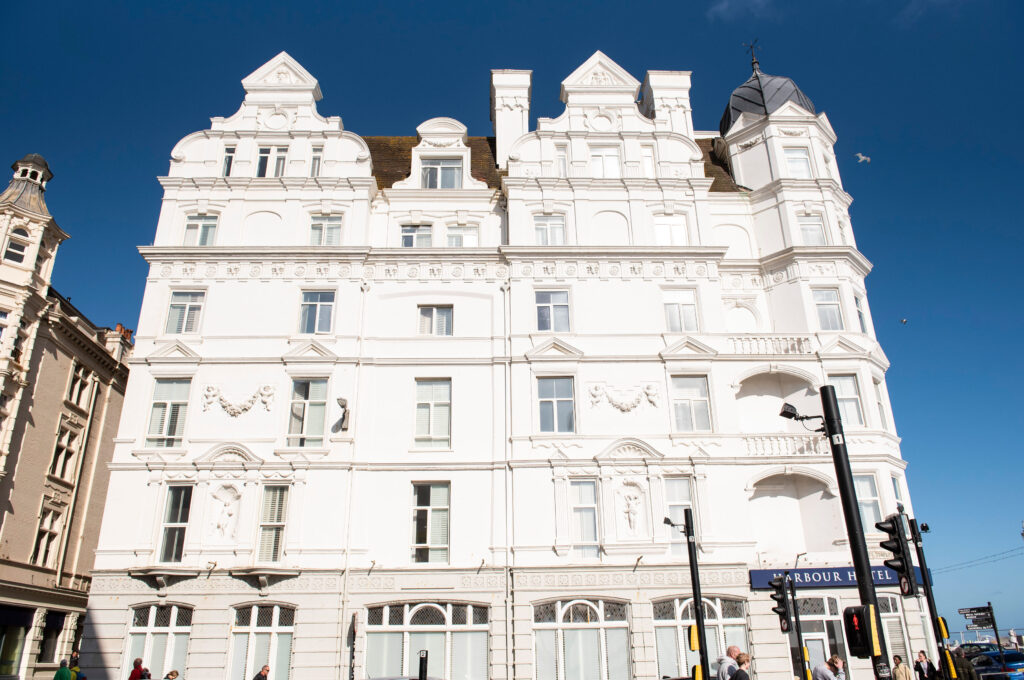
We ask ourselves what colour the sea is as the evening weaves in – and note a band of white tightens around the horizon, like a tourniquet, and then lapses. Then the dark comes in, and we deposit ourselves in our Egyptian cotton sheets.
The following morning, I’m given a tour of the hotel. There is a fine entertaining space here which can host up to 160 guests, and opens up onto the seafront – a useful destination to know about for both Brighton and London business owners.
The spa is in the basement of the hotel, and has specific hours for children’s swimming. There’s warm pool in the first room which you might just about do lengths in; it neighbours another a room with a hot tub. You expect that to be it, but down some stairs, more rooms unfold: another room of hot tubs, a steam room and sauna, and various areas for relaxation.
Ahead of you is the frame of an old door, which turns out to be a door to the past: the waterfront used to be lower, and my guide tells me that once-upon-a-time these burrows were used for smuggling.
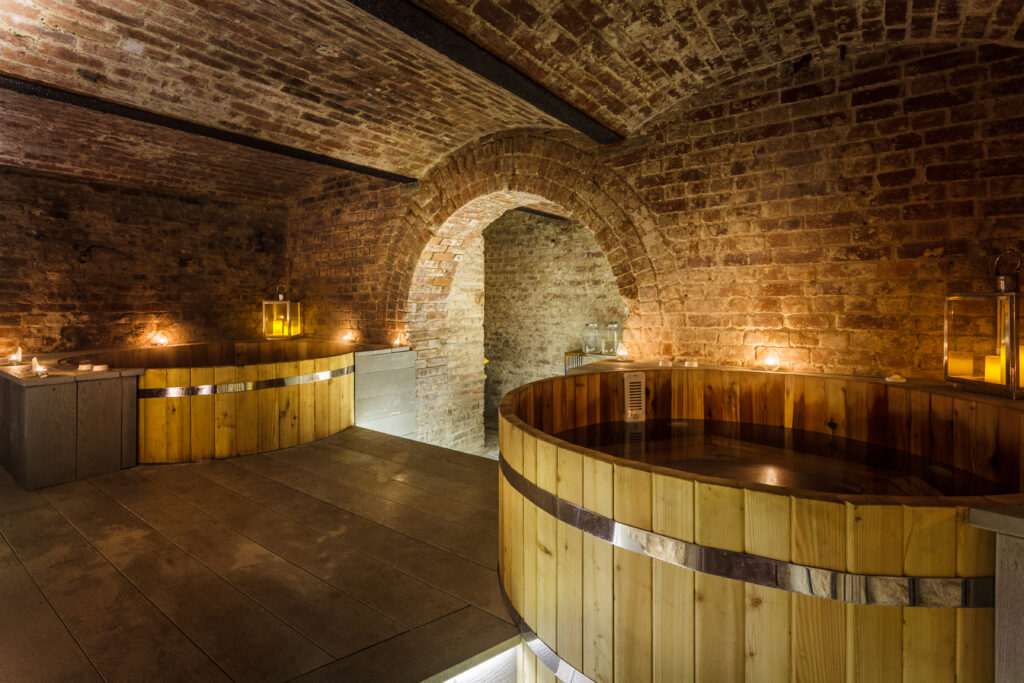
This is a clue to the real character of Brighton – in fact, to the whole of the southern coast. Seaside places tend to have bohemian characters. It was Robert Hughes who observed in relation to Madrid in his Goya biography that tyrants don’t love ports because they are too susceptible to outside influence. The longer you stay in Brighton the more you realise that the city belongs as much to the expansive dreamy views of the sea as to the land: there is something fantastical about it.
If you want evidence of this, you need only visit Brighton Pavilion, that wonderfully weird palace, built by George IV, and much loathed by that sober monarch Queen Victoria. It shows a man of unlimited wealth indulging a quixotic imagination, and reminds us that Brighton has known, at least for a time, what it is to seem – however illicitly – at the centre of the world. I say ‘illicitly’ because it was here, away from the prying eyes of London, that he could enjoy his liaison with Maria Fitzherbert.
The design of the Pavilion itself is by John Nash – who also designed Buckingham Palace and Regent Street – is bizarre, incorporating Indian and Chinese motifs. It is enough in itself to make Brighton feel odd, its centrepiece an escapist extravagance. A few streets away the rambling Steine House has a plaque to Fitzherbert: in its slightly ramschackle appearance it hints at the unhappy end of their affair.
A day by the sea at Brighton on a hot day is an intense and crowded experience. George IV came here hoping it would cure his gout, but in the era of Covid-19 one is more likely to be here to combat boredom. Philip Larkin once wrote of the ‘miniature gaiety of seasides’ – but Brighton has been bequeathed a sort of scale by the virus. Visitors shout in the shallows, amazed to be in such proximity to a coastline which they used to take for granted.
The sea remains the great sight of Brighton. Its slumbering strength is always there as a distraction, or a point of reference, throughout your time there: forever changing and always the same. You begin to feel that you could get used to this – especially at the Harbour Hotel with its white walls and excellent restaurant.
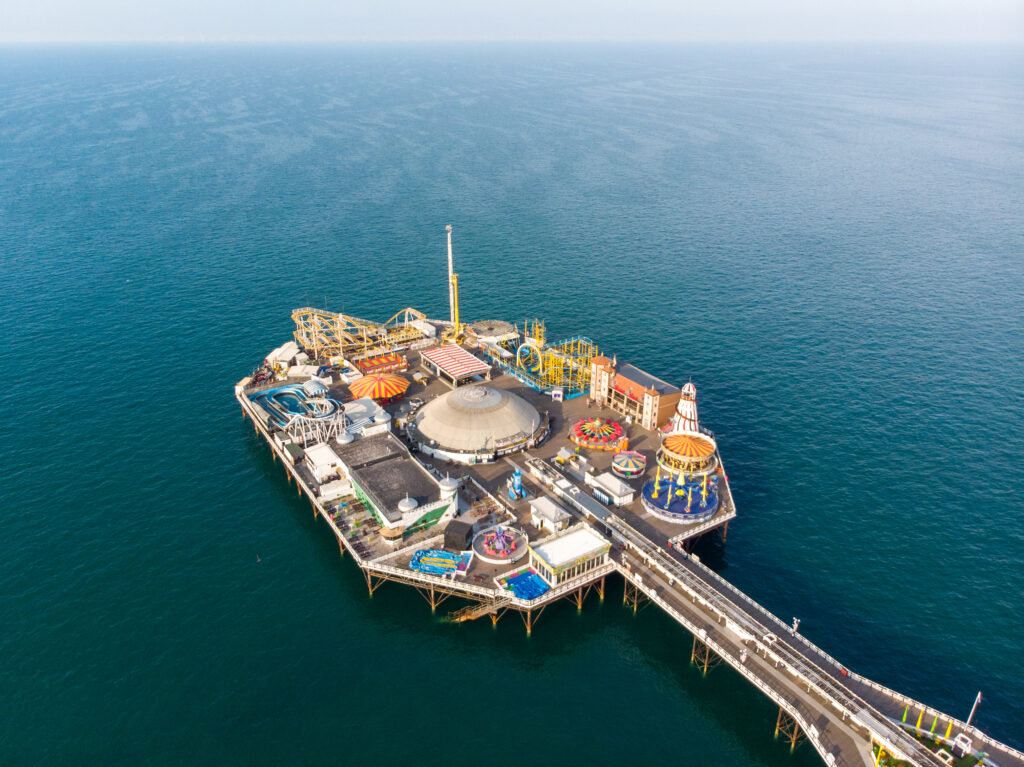
In fact, the Harbour hotel chain is one of the success stories of the pandemic. With properties in Chichester, Guildford, and Bristol – and two in Cornwall which must especially be the envy of international hoteliers – it has done a good trade throughout 2021 as people have decided against the absurdity of amber lists and 14-day quarantines, and shrugged off the idea of going to Greece if it’s really to be such a faff. Each staff member tells me an optimistic tale of wages topped up after furlough.
The group happens to be owned by Nicholas Roach, the son of Dennis Roach, who was regarded as the first-ever football agent, having negotiated the first £1 million transfer. Roach Jr. founded the holding company Nicholas James Group in 2000 and keeps a low profile.
This is in some contrast to his hotel in Southampton, the chain’s flagship property which dominates the skyline of the relatively new built Ocean Village marina. The property itself resembles a ship and our balcony suite turns out to be at the ship’s prow, opening up onto a view of the skyline.
(Incidentally, the Harbour in Southampton should undoubtedly be better known than it is as a conference room option for London businesses. The events space – also in the prow of the ship – swells dramatically towards the marina.)
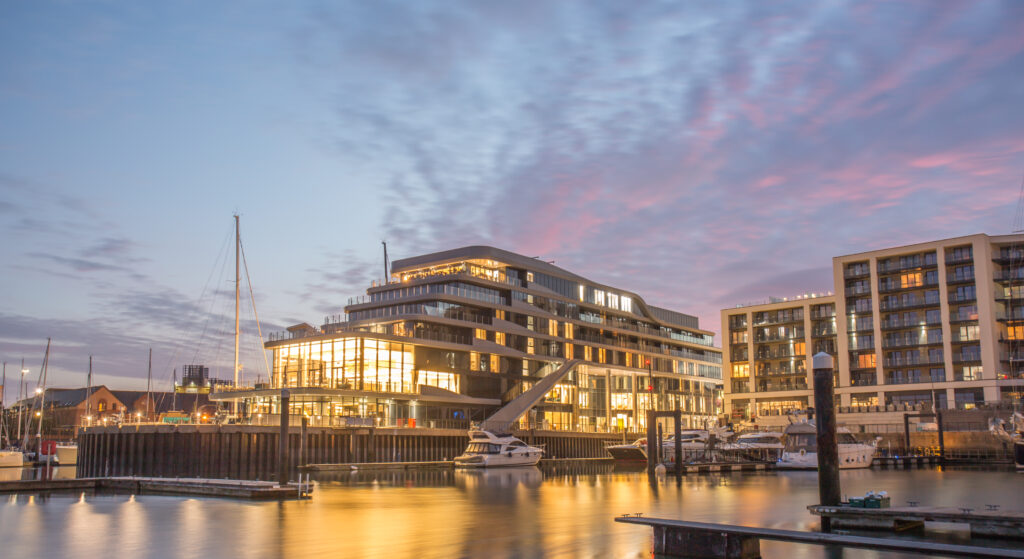
The clientele here is drawn by the hotel’s excellent spa offering. Just after breakfast on a sunny day white-towel-robed guests are lined up on loungers overlooking the marina. The hotel also regularly hosts famous sportspeople. Cricketers – including the Indian team – have been known to stay here, taking advantage of its close proximity to the Rose Bowl, as have household name footballers. Hugh Grant is also known to be a regular guest. If he’s coming for the food then he’s a wise man, as the restaurant on the top floor is consistently high quality.
Overall Southampton’s economy is larger than you might think – worth around £7.7 billion by most estimates, with some 8,310 businesses active as of March 2020. Most business growth is driven by small businesses, usually in the retail sector. The nearby port provides 8,000 jobs and the scale of activity is something you vaguely sense at the Harbour: a gigantic car park opposite is filled every two days with cars intended for Amsterdam, and reminds of you of the extent of the export market.
Of course, being coastal has sometimes meant not trade but war, and the more time you spend on the south coast – at Portsmouth and Dunkirk too – you’re conscious of the ships or planes which descended on this island from hostile nations. The sea hasn’t only bought spices and craftspeople – but bows and arrows, and worse.
Nearby Arundel remains a highlight: the Collector Earl’s Garden, which used to be a car park, has since 2008 been one of the most beautiful gardens in England. Interestingly, it’s in Chichester cathedral that you find the famous statue about which Philip Larkin wrote his famous poem ‘An Arundel Tomb’ with the famous, oft-quoted ending: ‘What will survive of us is love’. That cathedral also has a glorious window by Marc Chagall. Meanwhile in Portsmouth, the Mary Rose museum remains one of the finest in the land. The New Forest, and the beaches around Dorset complete the picture.
You could spend two weeks here and not run out of things to do – a testament to our rich coastal history. It reminds you all over again what it means not to be landlocked. We returned home, refreshed, aware that once you give the mundane its beautiful due, it’s no longer mundane at all.